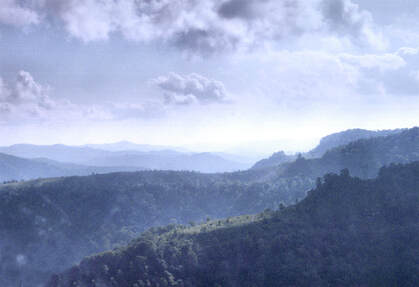
"Growing up, renegade black and white folks who perceived the backwoods, the natural environment, to be a space away from manmade constructions, from dominator culture, were able to create unique habits of thinking and being that were in resistance to the status quo." (bell hooks, belonging: a culture of place)
Today I re-read a chapter, Kentucky is my Fate, from one of my favorite bell hooks books, Belonging: A Culture of Place. I had read this before, and referenced it in my scholarly work; but re-reading a great writer who is a great thinker (many philosophers haven't mastered both skill sets) is a pleasure. The following quotes are interspersed, very lightly, by my thoughts. Much of what she describes as mountain culture in Kentucky is the same in rural Pennsylvania, a different part of Appalachia.
1. "[I]ndividual Kentuckians white and black, still managed to create sub-culture, usually in hollows, hills, and mountains, governed by beliefs and values contrary to those of mainstream culture." Rural people are socially constructed as having an inherent deficit. The people living in the backwoods are dehumanized, because life in the backwoods is a threat to white supremacist capitalist patriarchy. "[C]reating the notion that folks who inhabited these spaces were ignorant, stupid, inbred, ungovernable. By dehumanizing the hillbilly, the anarchist spirit which empowered poor folks to choose a lifestyle different from that of the state and so called civilized society could be crushed."
2. Rural Kentuckians, Black and White, shared an anarchic culture--an independence and self-reliance--that led to a culture of belonging. This was connected to the natural environment. Isolation was, in many ways, a good. As hooks writes, "Nature was truly a sanctuary, a place of refuge, a place for healing wounds. ... Folks living in the Kentucky hills priced independence and self-reliance above all traits. ... Nature was a place where one could escape the world of man made constructions of race and identity. Living isolated in the hills we had very little contact with the world of white dominator culture. ... Living among Kentucky mountain folk was my first experience of a culture based on anarchy. ... They made their own rules. ... the hills belonged to everyone."
3. Hooks identifies two competing cultures in Kentucky, "the world of mainstream white supremacist capitalist power and the world of defiant anarchy that championed freedom for everyone."
4. She writes about the confederate flag, which many White Kentuckians fly today with the slogan "heritage not hate." "For the confederate flag is a symbol of both heritage and hate. The history of the confederacy will always evoke the memory of white oppression of black folks with rebel flags, guns, fire, and the hanging noose--all symbols of hate. And even though many poor and disenfranchised white Kentuckians struggling to make their way through the minefield of capitalist white power mimic and claim this history of colonial power, they can never really possess the power and privilege of capitalist whiteness. They may embrace this symbol to connect them to that very world and that past which denied their humanity but it will never change the reality of their domination by those very same forces of white supremacist hegemony."
5. The oppression of Black and rural Whites in Kentucky shared a root. Conservative White Kentuckians aimed to disrupt and destroy both cultures. "Efforts on the part of conservative white Kentuckians to exploit and oppress black folk were congruent with the effort to erase and destroy the rebellious sensibility of white mountain folk. The anarchist spirit which had surfaced in the culture of white hillbillies was as much a threat to the imperialist white supremacist capitalist as any notion of racial equality and racial integration."
6. Bell hooks spend decades away from Kentucky, living a life "full of contradictions." These anarchist tendencies, and her maintaining "core beliefs in the power of divine spirit" ran contrary to her cosmopolitan academic life. Facing psychic wounds, and because "Madness was more acceptable away from home," she sought out a therapist to heal. But she "could not find a therapist who would acknowledge the power of geographic location, of ancestral imprints, of racialized identity." And "New York City was one of the few places in the world where I experienced loneliness for the first time. ... so many people engaging in a kind of pseudo intimacy but rarely genuine making community."
7. Rural challenges are exported. "During the more than thirty years that I did not make my home in Kentucky, much that I did not like about life in my home state (the cruel racist exploitation and oppression that continued from slavery into the present day, the disenfranchisement of poor and/ or hillbilly people, the relentless assault on nature) was swiftly becoming the norm everywhere. ... Yet returning to my home state all the years that I was living away, I found there essential remnants of a culture of belonging, a sense of the meaning and vitality of geographical place."
 RSS Feed
RSS Feed
